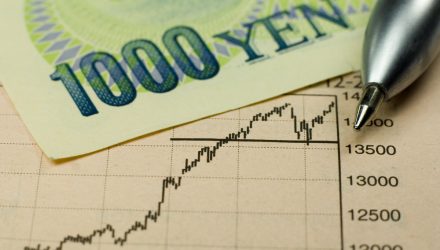Dividend turbulence is rearing its ugly around the world this year, but the FlexShares International Quality Dividend Index Fund (NYSEArca: IQDF) stands as one ETF that can help investors combat that ominous scenario and Japan is one reason why IQDF stands out.
One of the obvious points in IQDF’s favor is its 16.41% weight to Japan, which is among the highest among international dividend ETFs.
IQDF screens for management efficiency, profitability, and cash flow. Each company has to show management efficiency or firms that efficiently deploy capital and make smart financing decisions. Companies with wider profit margins are better positions to grow and maintain dividends than those with slimmer margins. Additionally, firms that can meet debt obligations and day-to-day liquidity needs are better capable of maintaining dividends.
“It’s unusual, given that Japan has much lower interest rates than the US, but the dividend yield on Japanese stocks is, at 2.44%. quite a bit higher than the S&P 500’s 1.86%,” said John Vail, Chief Global Strategist at Nikko Asset Management. “Furthermore, only a few Japanese companies have cut their dividends so far this year, while quite a few have in the US, with more dividend cuts likely to occur there, especially in the energy sector that is one of the largest contributors to the S&P’s aggregate dividend.”
IQDF Relevancy
The coronavirus pandemic certainly injected a healthy dose of fear for fixed income seekers as businesses that were strapped for cash saw their ability to churn out dividends in jeopardy.
Ex-U.S. developed market dividend payers often feature larger yields than their U.S. counterparts, an assertion proven by comparing large- and mega-cap dividend stocks from familiar dividend sectors such as consumer staples, energy, financial services, and telecommunications. IQDF’s Japan exposure could prove beneficial to investors in a volatile dividend environment. As a low-yield nation, Japan has the capacity to drive dividend growth.
Japan’s capital inefficiency has been a long-standing problem in Japan. To address this problem of excess cash, which is a good problem to have depending on who you ask, Prime Minister Shinzo Abe has been pushing to improve governance practices.
“Thus, especially with the Yen being such a firm currency, income investors globally should consider Japanese equities along with many other reasons like the country’s strong gearing to Asian economic growth, improving corporate governance that is unlocking shareholder value through higher dividends, and perennial technological prowess,” notes Vail. “Japanese investors are increasingly investing in equities for retirement and income investing, and dividend yields are especially attractive compared with virtually zero interest rates all through the yield curve up to 10 years, so there should be continued domestic buying support for equities.”
For more on multi-asset strategies, please visit our Multi-Asset Channel.
The opinions and forecasts expressed herein are solely those of Tom Lydon, and may not actually come to pass. Information on this site should not be used or construed as an offer to sell, a solicitation of an offer to buy, or a recommendation for any product.

